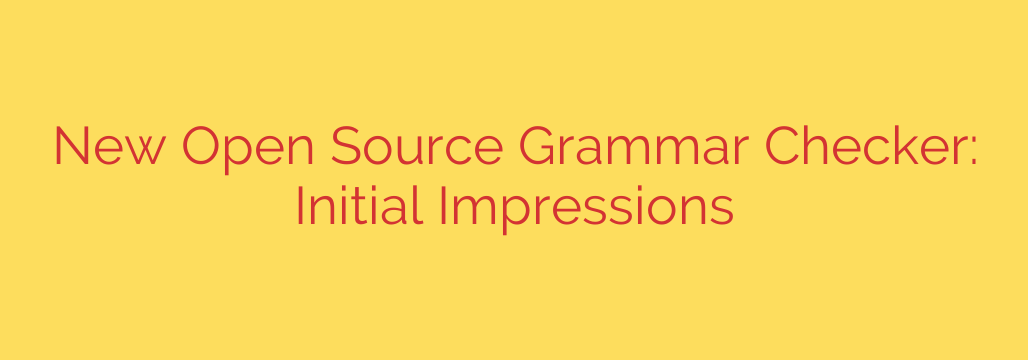
Tired of Grammarly’s Privacy Risks? Meet the Self-Hosted Alternative
In today’s digital world, online writing assistants are nearly indispensable. From polishing professional emails to drafting sensitive reports, tools like Grammarly have become a second pair of eyes for millions. But this convenience comes with a hidden cost: your privacy.
Have you ever paused before pasting a confidential document into an online grammar checker? If so, you’ve recognized the inherent security risk. When you use a cloud-based service, you are sending your text—be it a business plan, a legal contract, or a personal journal entry—to a third-party server for analysis. This raises significant questions about data security, ownership, and who might have access to your most sensitive information.
A new paradigm is emerging to solve this exact problem: powerful, open-source grammar checkers that you can host yourself. This approach represents a fundamental shift in how we handle our data, putting control firmly back in the hands of the user.
The Rise of the Local AI Writing Assistant
Imagine a grammar and style checker with all the AI-powered smarts you’ve come to expect, but with one crucial difference: it runs entirely on your own computer. Instead of sending your data across the internet to a corporate cloud, the analysis happens locally.
These new tools typically work by running an AI language model inside a container on your machine. A simple browser extension then connects to this local server, providing real-time suggestions directly in your text fields without your data ever leaving your device.
The Unbeatable Advantages of a Self-Hosted Solution
Switching to a local grammar checker offers several game-changing benefits, especially for those who prioritize security and control.
Absolute Data Privacy: This is the most significant advantage. Your text never leaves your machine. This makes it the perfect solution for professionals handling sensitive information, such as lawyers, doctors, researchers, and corporate employees. There is zero risk of your data being compromised by a third-party breach, sold to advertisers, or used to train other AI models.
Complete Offline Access: Because the software runs on your computer, you don’t need an internet connection for it to work. You can work from anywhere, on a plane, or in a remote location, with the full power of your writing assistant available. This is a level of freedom that cloud-based services simply cannot offer.
Full Control and No Subscriptions: As an open-source tool, you have complete control. There are no recurring subscription fees, and you can be confident that the software isn’t collecting your data for monetization. For developers, this also means the potential to customize the tool or integrate it into other workflows.
A Realistic Look at the Current State
While the promise of a private, self-hosted grammar checker is exciting, it’s important to have realistic expectations. These projects are relatively new and represent a grassroots movement rather than a polished corporate product.
Technical Hurdles: The setup process is not yet a simple one-click affair. It often requires some familiarity with command-line tools and container platforms like Docker. This currently puts it in the realm of tech-savvy users, developers, and determined privacy advocates.
Performance and Features: While highly effective, the performance may not yet match the speed and refinement of mature platforms that have had years of development and massive server infrastructures. It’s a powerful tool that is constantly evolving, but may occasionally be slower or miss a nuanced suggestion.
Who Should Consider a Self-Hosted Grammar Checker?
This technology is a perfect fit for:
- Privacy-Conscious Individuals: Anyone who is uncomfortable sending their personal or professional writing to a third-party server.
- Developers and Tech Enthusiasts: Those who enjoy tinkering, value open-source software, and have the skills to manage a local server.
- Organizations with High-Security Needs: Companies and firms that have strict data-handling policies and cannot risk proprietary information leaving their network.
- Writers of Sensitive Content: Journalists, authors, and researchers who need to protect their sources, manuscripts, and intellectual property.
A Key Takeaway for Digital Security
The emergence of local grammar checkers highlights a critical security principle that extends far beyond writing assistants. Always ask: where is my data going? Before adopting any new app or service, especially one that handles your personal or professional information, take a moment to understand its data architecture. Opting for solutions that prioritize local processing is one of the most powerful steps you can take to safeguard your digital privacy.
While not yet for everyone, the self-hosted grammar checker represents the future of secure, user-centric software. It’s a clear signal that users are demanding more control over their data, and the open-source community is rising to the challenge.
Source: https://itsfoss.com/harper-grammar-checker/








